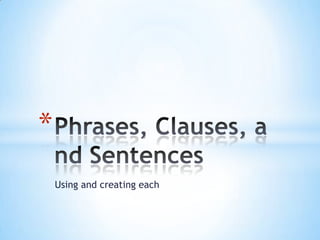Phrases, clauses, and sentences
•Download as PPTX, PDF•
55 likes•39,302 views
PowerPoint of the variety of phrases, clauses, and sentences
Report
Share
Report
Share

Recommended
Recommended
More Related Content
What's hot (20)
Viewers also liked
Viewers also liked (20)
English Language Terminology - Phrases, Clauses and Sentences

English Language Terminology - Phrases, Clauses and Sentences
Simple, Compound, Complex, Compound Complex Sentences

Simple, Compound, Complex, Compound Complex Sentences
Similar to Phrases, clauses, and sentences
Similar to Phrases, clauses, and sentences (20)
Syntax, the study of structure of phrase and sentence

Syntax, the study of structure of phrase and sentence
Basic writing skills for simple PresentationA.pptx

Basic writing skills for simple PresentationA.pptx
More from Daniel Proffitt
More from Daniel Proffitt (11)
Recently uploaded
Mehran University Newsletter is a Quarterly Publication from Public Relations OfficeMehran University Newsletter Vol-X, Issue-I, 2024

Mehran University Newsletter Vol-X, Issue-I, 2024Mehran University of Engineering & Technology, Jamshoro
Recently uploaded (20)
Fostering Friendships - Enhancing Social Bonds in the Classroom

Fostering Friendships - Enhancing Social Bonds in the Classroom
ICT role in 21st century education and it's challenges.

ICT role in 21st century education and it's challenges.
Beyond_Borders_Understanding_Anime_and_Manga_Fandom_A_Comprehensive_Audience_...

Beyond_Borders_Understanding_Anime_and_Manga_Fandom_A_Comprehensive_Audience_...
Exploring_the_Narrative_Style_of_Amitav_Ghoshs_Gun_Island.pptx

Exploring_the_Narrative_Style_of_Amitav_Ghoshs_Gun_Island.pptx
Micro-Scholarship, What it is, How can it help me.pdf

Micro-Scholarship, What it is, How can it help me.pdf
UGC NET Paper 1 Mathematical Reasoning & Aptitude.pdf

UGC NET Paper 1 Mathematical Reasoning & Aptitude.pdf
HMCS Max Bernays Pre-Deployment Brief (May 2024).pptx

HMCS Max Bernays Pre-Deployment Brief (May 2024).pptx
ICT Role in 21st Century Education & its Challenges.pptx

ICT Role in 21st Century Education & its Challenges.pptx
This PowerPoint helps students to consider the concept of infinity.

This PowerPoint helps students to consider the concept of infinity.
Food safety_Challenges food safety laboratories_.pdf

Food safety_Challenges food safety laboratories_.pdf
Phrases, clauses, and sentences
- 1. Using and creating each Phrases, Clauses, and Sentences
- 2. Phrases Phrases are a group of words that lacks a subject, predicate, or both. Phrases can take many different forms: Prepositional phrases Verb phrases Adjective phrases Adverb phrases Noun phrases Verbial phrases
- 3. Phrases Prepositional Phrases Begin with a preposition (a word that shows position, location, or direction) Ends with an object of the preposition (noun or pronoun) Can be used as adjectives (words that describe a noun or pronoun). Adjectives answer what kind, how many, which one Can be used as Adverbs (words that describeverbs, adjectives, or other adverbs). Adverbs answer where, when, how, or to what extent
- 4. Phrases Verbial phrases Verbs that act as other parts of speech Types: Gerund phrase = Verb ending in ING and is used as a noun. Example: Swimming is a fun exercise. Participle phrase = Verb ending in ING or ED is used as an adjective. Example: 1. Rattlingin the cabinets, the dishes were about to crash to the floor. 2. Why didn’t the tired boy just stand still? Infinitive phrase = Verb that starts with to and is used as a noun, adjective, or adverb. Example: I am afraid to swim.
- 5. Clauses A clause is group of related words that has both a subject and a predicate. They DO NOT have to form a complete thought. Types: Independent Dependent
- 6. Clauses Independent Clauses: Have a subject and a predicate and can stand alone as a sentence. When standing alone, an independent clause is ALWAYS a simple sentence (ONE subject and ONE predicate only) Example: This ancient oak tree may eventually be cut down.
- 7. Clauses Dependent Clause: Have a subject and a predicate, but will NEVER express a complete thought. These clauses can not be a sentence by itself. A dependent clause depends on being connected to an independent clause to make sense. These clauses are also known as SUBODINATING CLAUSES because of the words that start them (subordinating conjunctions: AFTER, ALTHOUGH, BECAUSE, BEFORE, IF, SINCE, WHEN, etc.) The following words can also start a dependent clause: who, which, whose, that
- 8. Sentences A sentence has at least one subject, at least one predicate, and expresses a complete thought. A sentence ALWAYS begins with a capital letter A sentence ALWAYS ends with a period, question mark, or exclamation mark
- 9. Sentences Simple sentences: A simple sentence is one independent clause. Simple sentences may contain a simple or compound subject Simple sentences may contain a simple or compound predicate. John and his friend played basketball after school. Icebergs form glaciers and float in the ocean.
- 10. Sentences Compound sentences: Happen when two or more simple sentences (independent clauses) are combined with each other. When making a compound sentence, you must use the words For, And, Nor, But, Or, Yet, So Use the acronym FANBOYS to help you remember. The FANBOYS cannot begin a sentence (They are COMBINING words)
- 11. Sentences Complex sentences: Combine a dependent clause and an independent clause together. When making a complex sentence, you must use a subordinating conjunction or a relative pronoun. See page 710 and page 744 for a complete list of these words
- 12. Sentences Complex sentences: If a dependent clause comes first, a comma is used after the clause. Example: When I left for home, my aunt stood teary-eyed in the doorway. If a dependent clause comes last, no comma is needed. Example: My uncle Louis died soon after I left for home.
- 13. Sentences The four types of sentences include: Imperative = giving a command Interrogative = asking a question Declarative = making a statement Exclamatory = showing emotion Each sentence ends with a different type of punctuation. The imperative sentence can have what is known as an understood “you”. This means the subject is not explicitly stated, but must be interpreted.